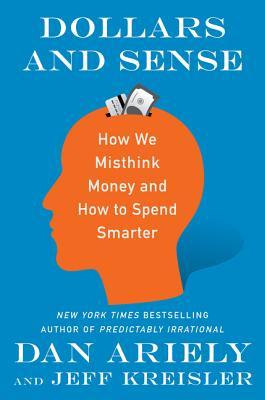
Dollars and Sense: How We Misthink Money and How to Spend Smarter
Dan Ariely, Jeff Kreisler
About the Author

Dan Ariely
Questions & Answers
Cognitive biases and mental shortcuts lead to poor financial decisions and irrational spending behavior due to their tendency to simplify complex decisions and often lead to suboptimal outcomes. For instance, the "relativity" bias causes individuals to focus on percentage savings rather than absolute amounts, leading to overestimating the value of small savings and underestimating larger expenses. Mental accounting, while helpful for budgeting, can also lead to misclassification and creative accounting, justifying unnecessary spending. The "anchoring" bias causes individuals to rely heavily on initial information, like a listed price, to determine value, even if it's irrelevant. Confirmation bias reinforces existing beliefs by seeking out information that confirms them, ignoring contradictory evidence. Additionally, the "pain of paying" can reduce self-control, making it easier to succumb to temptation. These biases and shortcuts, combined with the manipulative tactics of commercial interests, often result in irrational spending and poor financial decisions.
The most common mistakes people make when assessing the value of goods and services include:
- Overvaluing based on relativity: Comparing prices to other items or past experiences can lead to overvaluing or undervaluing products.
- Mental accounting: Categorizing money into different mental accounts can lead to poor budgeting and spending decisions.
- Ignoring the pain of paying: Using credit cards or other payment methods that reduce the immediate pain of paying can lead to overspending.
- Anchoring: Being influenced by the first price or value encountered can skew perceptions of value.
- Overvaluing what we have (endowment effect): We tend to overvalue items we own, leading to poor selling decisions or reluctance to part with them.
- Fairness and effort: Believing that higher prices are justified by more effort can lead to paying more than necessary.
- Overemphasizing money: Focusing too much on money can lead to ignoring the true value of experiences and relationships.
These mistakes can negatively affect financial well-being by leading to:
- Poor budgeting and overspending: Spending more than one can afford or saving less than needed.
- Inefficient investments: Investing based on emotions or misleading information rather than rational analysis.
- Reduced long-term financial security: Not saving enough for retirement or emergencies.
- Increased stress: Financial strain can lead to stress and other negative health outcomes.
Understanding the psychological aspects of money can significantly enhance financial decision-making and overall well-being. By recognizing cognitive biases like mental accounting, pain of paying, and loss aversion, individuals can avoid irrational spending and better manage their finances. This awareness helps in:
- Avoiding Impulse Purchases: By understanding the pain of paying and the allure of immediate gratification, one can resist unnecessary purchases and save more effectively.
- Making Informed Choices: Recognizing the influence of framing and expectations can lead to more rational evaluations of products and services, avoiding overvaluing based on price or perceived value.
- Improving Long-term Planning: Understanding the importance of delayed gratification and the long-term impact of financial decisions can encourage better retirement planning and investment strategies.
- Enhancing Self-Control: By acknowledging the power of temptation and designing environments that minimize it, individuals can improve their self-control and make more sustainable financial choices.
- Promoting Financial Literacy: Awareness of these psychological factors can encourage individuals to seek financial education, leading to better money management and overall well-being.
To overcome cognitive biases and make more rational financial decisions, consider these strategies and tools:
- Opportunity Cost Awareness: Calculate the opportunity cost of each purchase, considering what you could have gained by not spending that money.
- Avoid Relativity: Focus on the absolute cost rather than the percentage of your total spending.
- Mental Accounting Wisely: Use mental accounting to simplify budgeting but be aware of its limitations.
- Anchoring Avoidance: Be cautious of initial prices or suggestions that can anchor your perception of value.
- Future-Oriented Thinking: Connect with your future self to improve self-control and long-term savings.
- Automated Savings: Use automatic transfers to save money without needing to make decisions each month.
- Reward Substitution: Set up incentives for saving, like lottery-based savings plans.
- Financial Apps: Use apps to track spending, calculate opportunity costs, and manage budgets.
- Information Moderation: Be cautious of information overload, as it can reduce motivation.
- Financial Education: Stay informed about financial products and your own biases.
Implementing these strategies can help you make more informed and rational financial decisions.
To cultivate a healthier relationship with money and mitigate its negative impact, we must first recognize our cognitive biases and mental shortcuts. This involves:
-
Understanding Cognitive Biases: Be aware of biases like loss aversion, anchoring, and overvaluing what we have. These can lead to irrational financial decisions.
-
Mindful Spending: Reflect on purchases and consider the long-term implications, not just immediate gratification. Use tools like mental accounting to categorize spending but be mindful of its limitations.
-
Self-Control: Develop strategies to resist temptation, like pre-committing to savings plans or using payment methods that increase the pain of paying.
-
Educate and Communicate: Share financial knowledge with others and discuss money openly to foster a more informed society.
-
Design Systems for Better Outcomes: Advocate for financial products and services that align with rational decision-making and reduce the exploitation of cognitive biases.
-
Focus on Life's True Value: Remember that money is a means to an end, not the end itself. Prioritize experiences, relationships, and personal growth over material wealth.
By addressing these aspects, we can foster a healthier relationship with money and create a more financially literate and stable society.